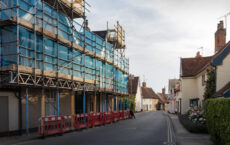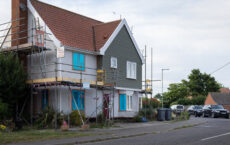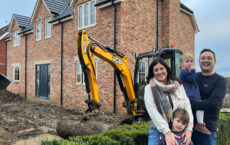Brownfield sites are previously developed land, originally used for industrial, commercial, or even agricultural purposes, but that now lay redundant. Redeveloping brownfield sites not only helps the government meet targets for house builds, it breathes new life into communities and helps to preserve our green, open spaces.
As part of the UK’s commitment to redeveloping brownfield land, commercial developers have financial incentives to build on brownfield sites, such as through the Land Remediation Tax Relief system, which aims to reduce the cost of undertaking regeneration projects. However, this isn’t the case for individual self builders.
82% of self builders would be more tempted to use brownfield sites if offered a monetary benefit
We undertook a survey* on the subject of brownfield sites and self build projects, revealing more than eight out of ten potential self builders would feel more inclined to consider a brownfield site if they were offered a tax break such as VAT exemption, or other monetary benefit such as a government loan.
In fact, sentiment around brownfield sites was very positive, although awareness was low.
Our survey found that a third of aspiring self builders were not aware of the brownfield land registers, which are essentially local government databases filled with information on sites considered to be appropriate for residential development. When the concept was explained, almost double the number of people (61 per cent) felt the registers had potential to help them find a suitable plot in the future.
Establishing a suitable site is a notorious challenge for self builders, but brownfield sites hold enormous opportunity, especially with the government recently announcing that developers will no longer be required to submit a ‘normal’ planning application to build on brownfield sites if this land is being used to build homes. It’s a sigh of relief for anyone who has been through the battle of gaining planning permission before!
What makes self build projects so popular?
More than a third (35 per cent) of respondents were considering a self build project at some stage in the future. For over half of these (51 per cent), this decision was spurred by the ability to design the layout of their own home, with the ability to make environmentally-friendly decisions popular among 28 per cent. Economic or financial reasons were cited by 17 per cent of people.
In order for the government to continue their push to encourage home building, brownfield land registers need to be better promoted and individual self builders should be offered financial incentives akin to commercial developers.
You’ll need a self build mortgage for your brownfield renovation project
It’s really important that self builders considering a brownfield renovation project base their costs on a self build mortgage rather than a standard residential product, as most lenders will see major renovation work or rebuilds as belonging to their self build criteria.
It is unlikely lenders will look on a brownfield plot any less favourably when submitting a self build mortgage application, but you must have done your homework and make sure any contamination from any previous activity has been addressed. Crucially the site must be suitable for undertaking a residential development. Given the complexity of this type of mortgage, it makes sense to do your due diligence or enlist the help of a specialist mortgage intermediary. These projects can be more complicated, and you’re therefore much more likely to be accepted by a provider who undertakes a manual lending approach, such as here at Ipswich Building Society. We can’t promise to lend on every brownfield site but we promise to give your application the careful consideration it deserves.
*Research was conducted by Walnut Research on behalf of Ipswich Building Society between 24-27 July 2020 amongst 2,012 UK adults aged 18+.


















